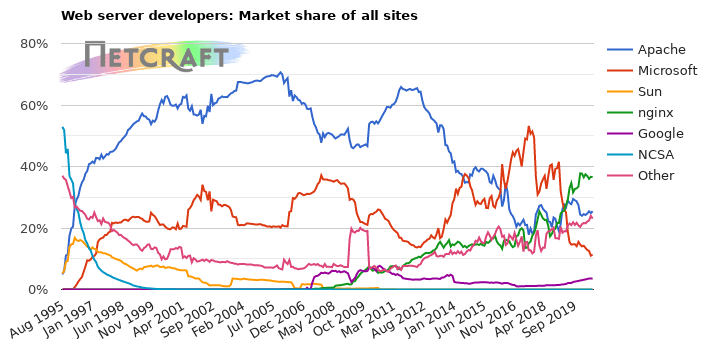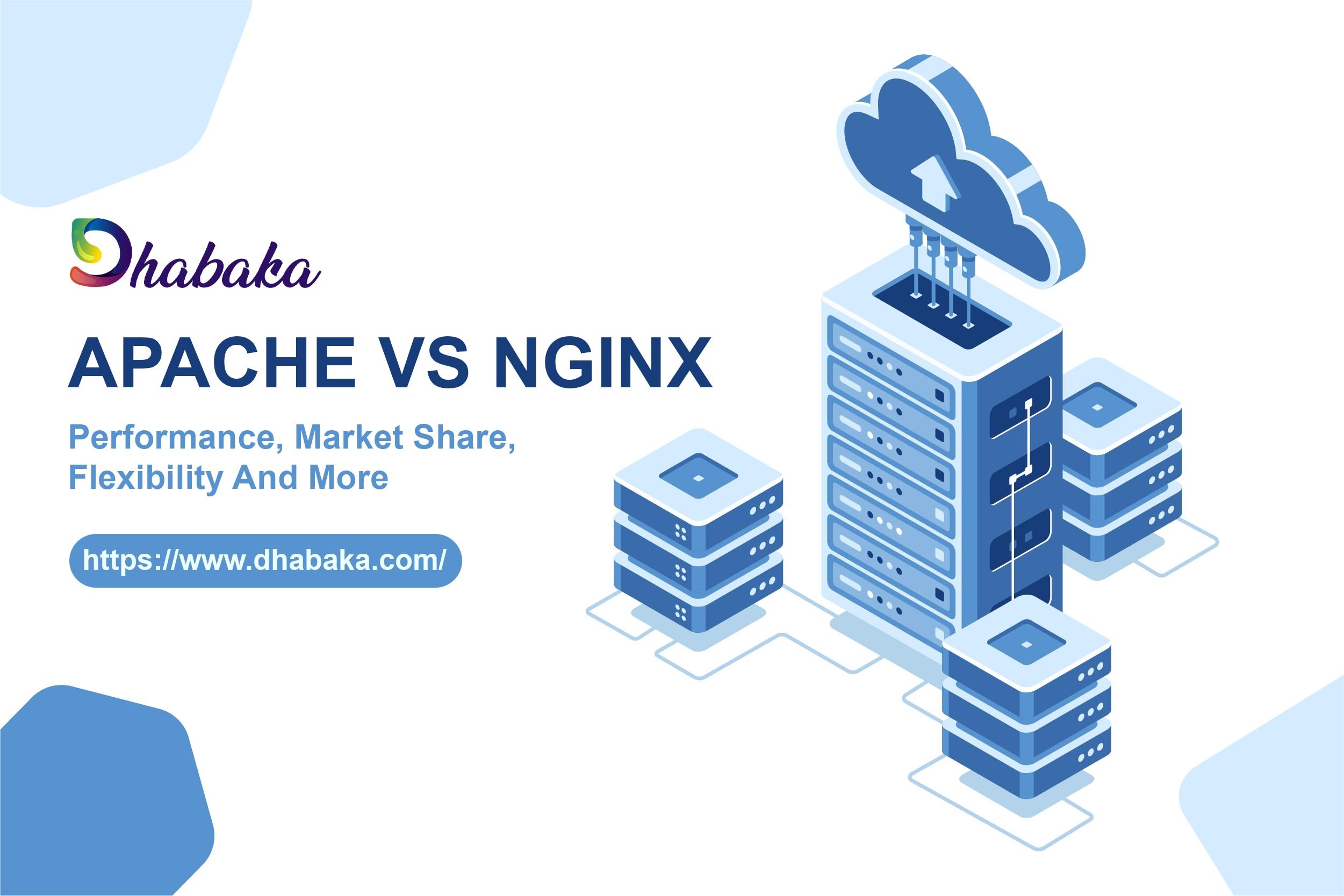Hey guys, welcome back to Dhabaka.com. Today’s topic is Apache vs NGINX Performance, Market Share, Flexibility and more. So I’m going to give you a complete detailed comparison between these messy competitors in the server world.
Before starting let’s quickly go through their market share. So it will increase your interest to know about it because how the NGINX is competitive and become the second-largest market shareholder after the Apache and approximately 35% share has been cut down by this NGINX.

So let’s move to the graph from 2007 to 2020. How the graph is raising offing if you’ll see the green bar. The green bar has started in 2007 and raising continuously. The Apache has approximately or you can say 53% where NGINX hadn’t started that time in 2017. And if we come to Mars 2020 and it has an approximately nearby share of Apache.
So it has started in late and but till when the market share of Apache was approximately 53% and right now it’s 35%. So almost around 32% share has been cut down by this NGINX. And Microsoft also was at the top and now it’s running down because nowadays people like open-source things. But for Microsoft, you have to purchase some kind of license. So people don’t prefer that.
There are some restrained is it over Microsoft but we are not going to discuss Microsoft in this section. We are only focusing on the Apache and the NGINX, how massive growth of NGINX is going on.
So you must know about NGINX and it may increase the speed of your website because in these two massive platforms there are some advantages and disadvantages. So I am going to explain to you the same thing which server you need to take according to your application. I am going to explain to you the six parameters and just to go through that in the next few hours and after that, you will be able to decide with which server you need to do.
Sometimes people prefer the combines combined server and if you need any help in this you can go through our comment section which is given in bellow and get help with our server experts. So I am going to compare these two massive competitors on the six parameters, first in the performance, second is the operating system, third in the security, fourth is the flexibility, the fifth is the documentation and six one is support. So let’s talk about first.
Performance
If you are going with the performance, there are two major categories of performance. First is the static content and second is the dynamic content. So the static content is your images, your javascript, your CSS, your videos this kind of study contentment doesn’t change according to the user behavior. And second is the dynamic content. The logic and dynamic scripts like you have made a login system, accordingly to login user we see the content according to their user role.
So if everything is going to login, it will see a different kind of content. If somebody has logged in he or she can see a different kind of content. That type of content is called dynamic content.
So let’s talk about first, the static content. In a static content, NGINX is the king. It means, there was a survey in 2015 that has been done on these two servers on the same hardware. So there were thousand requests content processes have been done at the same time and Apache has handled just only four hundred while NGINX handles all thousands.
So the point I’m saying in this way is to be informed that the NGINX is 2.5 times faster. And the one more interesting fact is NGINX has consumed 4% less memory than the Apache. So there was a huge difference and after that, the popularity of NGINX has increased and if we see the graph, we will see after 2015 the growth has been a little bit more increased.
With this, it has some more benefits as it has supported by the reverse proxy, load balancers, and HTTP Cache which also make it more like an increase in the performance of this.
Also Read: 5 Best cPanel Alternatives
Let’s talk about the dynamic content which is the second category under the performance. In dynamic content, both are there properly configured, both work like the same. So if you talk about the overall performance and like overall the rating under the performance, NGINX is coming like winning this particular game in the performance.
Security
Let’s move on to the second point which is security. In security, both can handle DDoS attach and protocols. So there is no much comparison if you both have done well.
Flexibility
The next point is flexibility. In flexibility, there Apache hits. Because there is a .htaccess where you can overwrite the modules like there is a global configuration of .htaccess and there is a configuration that you can manually do with the subfolders or the subsites which are working under a single web server. So there is nothing like this in the NGINX. You have just one configuration on the global configuration which can be done.
So in the shared servers or web servers still you will get Apache. Most of the users who are using WordPress and are on the shared server, the would not get NGINX, the get Apache because it is not possible right now. They have launched something like that but it’s not much time there. It’s very difficult for GoDaddy or big hosting providers who are dealing with shared hosting to upgrade their servers to NGINX.
There is no need for this because for the smaller website it doesn’t matter at that level to use either Apache or either NGINX. If you have huge traffic on your website and you want to deal with it then you have to decide this particular where you will have to use NGINX and in which module. So here Apache is winning the game.
Documentation
Let’s move on to the next point, the documentation. Documentation is very important if we talk about the server’s because here nobody is going to help you. You’re your teacher. Being a developer you have to read the documentation if you have to implement that. If you get any problem in front of your fault so you have to read their documentation and find a solution yourself or using a community.
So it’s very important to have good documentation of whatever software you are going to use. So both have well excellent documentation on the Internet. But NGINX leads here because they have a special program and online video training courses for how to set up their server and that is official. They also provide a certification in particular this. So NGINX is quite well-doing in this particular training or this documentation part by launching the video part. There is nothing of the video part of Apache.
But you get those are the freelancers or the free open-source community has made some videos over YouTube. But there is nothing official like that. So here NGINX is winning the game.
Support
Let’s move on to the last point which is support. Both have good support like if we talk about commercial support like free support is available for both. Both have a quite good community. But if we talk about the commercial support you have to go to the other companies.
But if you talk about in the NGINX, NGINX has a separate commercial product called the NGINX Plus. There they support you officially by the official, so if we’ll talk about the have money and you are going interested in taking the good support so you can directly approach to NGINX Plus plan and go ahead. Go with that.
But if we will talk about you don’t want to invest in the support system so you can move also with the Apache. There is a huge community and whenever you feel like you need some support you can approach the company. There are lots of company who is working from the last twenty to thirty years who is using Apache. So that’s all.
If we talk about the over length, we have discussed these six points. So now you might be confused like which from on we said what we have to go. So let’s talk about the overall.
So both are competing in the latest version to each server and for the static content, NGINX is winning the game. With the dynamic content, both are the same. NGINX has some good points in terms of media screaming, in terms of load balancing, in terms of HTTP caches. So here the good points if you have that much traffic like you want to make a website which is stream video, you have huge traffic and you need to load balancers, or like simultaneous servers, so you can go with the NGINX.
If you were planning to make a shared hosting and you want to launch multiple websites and you are to be able to separate modules according to the website in the same server so you must move with an Apache. Because that’s not possible in the NGINX to dynamically load the module folder wise. You have to decide a time and one level at the root level right now. They are trying they are working on this. So might be its launch in some coming days.
The preference is still like if people need to make VPS or dedicated or the containers servers, so they mostly go with the NGINX, and if they are planning to move with a shared one and the web hosting then they want Apache. Sometimes people use combine servers. For the static content a separate set of the NGINX and the for the dynamic content there is some set up for Apache.
In the end, let’s look at the side by side comparison between Apache and NGINX.
| Apache | NGINX |
| It is designed to be a web server. | It is designed to be both. A web server and a reverse proxy server. |
| Can not process multiple requests concurrently with heavy web traffic. | Can process multiple client requests concurrently with limited resources. |
| Has a multi-threaded approach to process client requests. | Has an event-driven approach to server-client requests. |
| Modules are dynamically loaded or unloaded making it more flexible. | Modules can not be loaded dynamically. Must be compiled within the core software. |
| Handles dynamic content within the web server itself. | Can not process dynamic content natively. |
Click here to visit official Apache site.
Click here to visit official NGINX site.
So that’s all guys from my side. If you will look, if you need some kind of help, you can contact us. If you like this article please comment and share and if you have some suggestions, we will love to hear the feedback. So just subscribe. You get the latest updates regarding our latest article.
